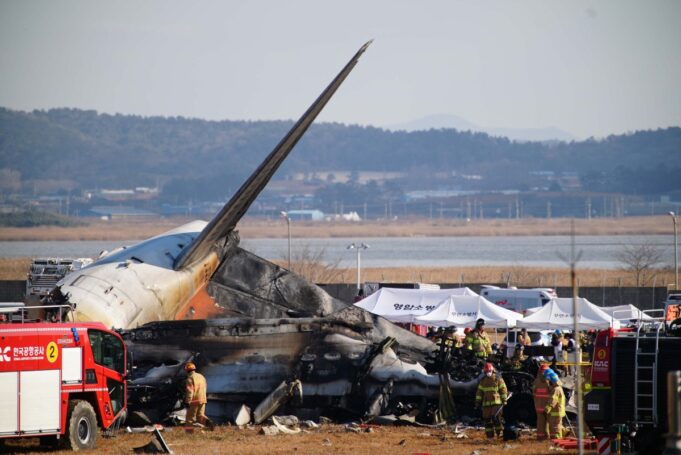A Jeju Air flight carrying 181 people from Thailand to South Korea tragically crashed upon arrival at Muan International Airport on Sunday, smashing into a barrier and bursting into flames.
Authorities confirmed that only two survivors, both flight attendants, were rescued, while 167 others were feared dead, with recovery efforts still ongoing.
The flight, originating from Bangkok, reportedly encountered a bird strike and adverse weather conditions, which are believed to have contributed to the crash.
Fire officials stated that the impact of the crash ejected passengers from the plane, leaving little chance of survival.
The aircraft, a Boeing 737-800, was described as “almost completely destroyed,” and identifying the victims has proven to be a challenging and lengthy process.
A video from the scene showed the plane landing on its belly, skidding off the runway, and crashing into a wall before exploding in flames.
The wreckage of the aircraft, including seats and luggage, was scattered near the runway as emergency crews worked to secure the site.
The crash occurred shortly after 9:00 am (0003 GMT), when the pilot of Flight 2216 issued a Mayday call, about two minutes before the plane collided with the wall.
The Ministry of Land stated that it took roughly three minutes for the aircraft to attempt its landing after a bird strike warning was issued by the control tower.
The runway at Muan Airport is 2,800 meters long, and authorities have ruled out the runway length as a contributing factor to the crash.
South Korean officials, including the acting President, Choi Sang-mok, quickly convened emergency meetings to manage the aftermath of the tragedy.
Jeju Air, South Korea’s largest low-cost carrier, expressed its deepest apologies and pledged to provide support to the victims’ families. Boeing also offered assistance, ensuring they would stand ready to help in any way possible.
This is the first fatal accident involving Jeju Air, though the airline had previously experienced a less severe incident in 2007 when a smaller aircraft was forced off the runway in Busan.
South Korea’s aviation industry has been known for its strong safety record, but experts warn that bird strikes can be particularly dangerous if they cause engine failure.
The incident has prompted a renewed focus on the safety measures for preventing bird strikes, which are responsible for several aviation accidents worldwide.

















